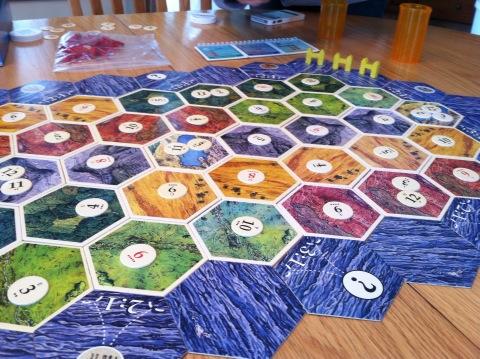shows how each hex is assigned a different number.
Suppose in the course of the game you have obtained a settlement on the corner of a 6, 9, 10 spot. How does that compare to say, a city (which collects double) on a 2, 3, 6 spot?
| Dice Rolling Combinations: Image by BestCase |
Because you are rolling two dice, certain numbers are more likely to come up than others. For instance, 7's are more likely than 10's because there are more ways that you can roll a 7 than rolling a 10. In the image to the right, you can see that there are six ways to get a 7 but only 3 ways to get a 10. Over the course of time, more sevens will usually come up than 10's. Settler's does a nice job of helping you see this by placing dots on the number tiles. Each dot represents the number of ways of obtaining that number. For instance, the 6-tiles each have five dots on them because there are five ways of rolling them.
Probability, with dice and cards for instance, is calculated by dividing the number of ways of obtaining a desired outcome by total number of ways possible. So for rolling a 10, the probability is 3 out of 36, or about 9 percent.
Expected value is useful when different outcomes have different payouts. For instance, in the course of the game you might find yourself receiving five different cards every time a 4 is rolled, or three different cards whenever a 8 is rolled. 8's are rolled more often, but 4's receive more when they are rolled. We would say both of these have the same expected value. Expected value is calculated by multiplying the probability of an outcome by its payout. Rolling a 4 has a probability of 3/36 * 5 cards is an expected value of 15/36. Rolling an 8 has a probability of 5/36 * 3 cards gives an expected value of 15/36.
At the start of the game, I had a settlement on a 6, 9, and 10, and I had a city on 2, 3, and 6. Settlements receive one card each, and cities two. So to begin, I would calculate my expected value as:
6: 5/36 * 1 = 5
9: 4/36 * 1 = 4
10: 3/36 * 1 = 3
2: 1/36 * 2 = 2
3: 2/36 * 2 = 4
6: 5/36 * 2 = 10
Total: 27/36
This suggests if I rolled the dice 36 times, I should expect 27 cards when all is done. Reduced, this suggests I will earn cards at an average rate of 3/4 of a card per roll of the dice. Some days I'll gain more than that but others I'll gain nothing.
As the game progresses, I'll have more settlements and cities, and my expected number of cards each roll of the dice should increase. Tomorrow's post will expand on this, and show the importance of increasing this expected value as quickly as possible.

No comments:
Post a Comment